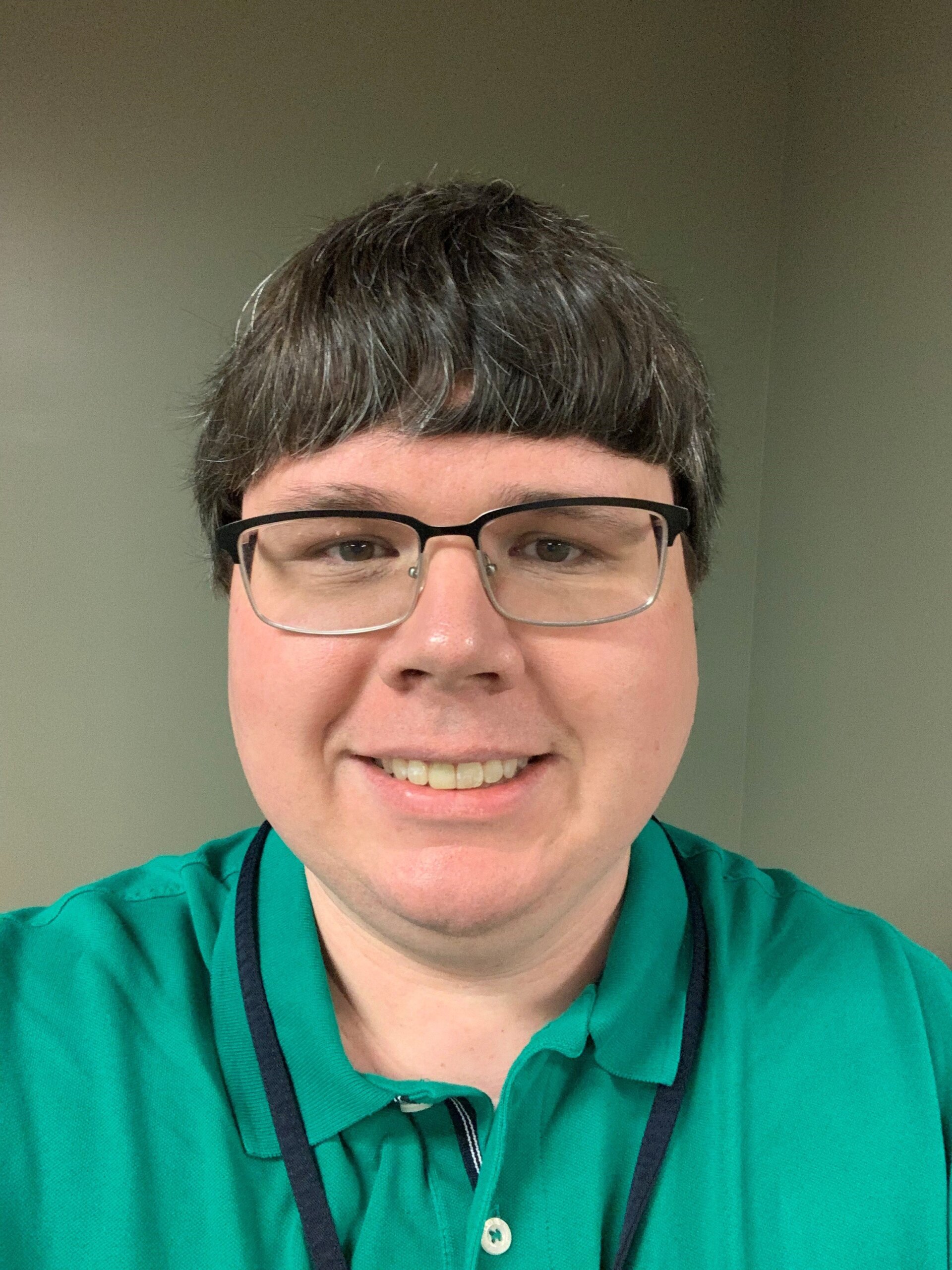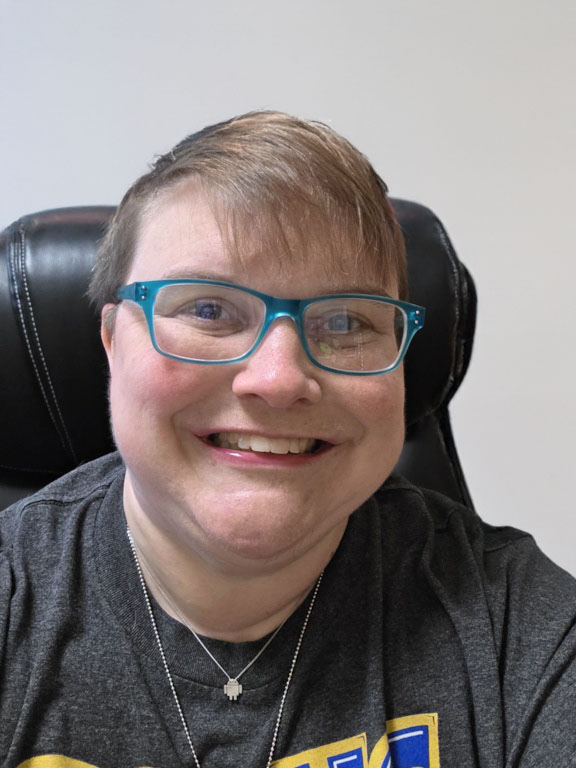Autism Acceptance at DePaul

World Autism Acceptance Month in April is an opportunity to reflect on how we can foster inclusion and understanding for individuals with Autism, focusing not only on awareness but also on acceptance as we embrace and support those on the spectrum.
Read on as DePaul’s WorkGuide client Matthew B. and Living Opportunities of DePaul Residential Counselor Sue Abramowski share their lived experiences as individuals with Autism, what acceptance means to them, and how to be a friend or ally to someone with an Autism diagnosis.
DePaul WorkGuide Client Matthew B.

What does Autism acceptance mean to you personally and how is Autism acceptance different from Autism awareness?
I’m reminded of various times at a church I used to go to; people would offer up unique prayers at one point during the Mass and there would be one person who’d offer a prayer for a “cure for Autism.” This always bugged me because Autism is not a disease; you can’t cure it any more than you can cure being gay. What “Autism acceptance” means to me is people acknowledging that being autistic is part of who I am and that there’s nothing wrong with that. I view and experience the world through a different lens, and I don’t think that’s something to be “fixed” or “cured.” Also, being “aware” that someone has Autism or that Autism exists isn’t the same thing as accepting it since most people aware of Autism think it’s something that should be “dealt with” rather than accommodating for it. I hope that Autism acceptance becomes more commonplace over time.
Have you ever felt pressured to “mask” or hide aspects of your Autism to fit in? How has that affected you?
It’s hard to say, since I’m not fully sure what aspects of me count as autistic and whether or not my autistic aspects are something that need masking. I’ve known autistic people and they exhibit behavior I used to have when I was younger; behavior that many would consider rude and socially unacceptable. In those cases, it’s tempting to just let them be because “they’re autistic and don’t know any better,” but I feel like that’s only setting them up for more hardships down the line. While I think there should be some accommodation made for people with Autism, I think it’s better for them in the long-term to let them know that what they’re saying or doing is not OK. Accepting that someone is autistic and has different “quirks” doesn’t mean they should be allowed to get away with treating people badly, unknowingly or otherwise.
How do you feel when people say things like, “You don’t look autistic” or “Everyone is a little autistic?”
To the first question I’d say, “What is an autistic person supposed to look like?” Speaking for myself, I have had a number of people not even know I’m autistic until they start seeing my neuroatypical behavior or I outright tell them that I have Asperger’s Syndrome. It’s a lot like depression in a way – because you can’t actually see it like a physical disease or sickness, people have a difficult time comprehending or recognizing it, which is why Autism acceptance is so important.
As for the “everyone is a little autistic” remark, I can kind of get where they’re coming from. It’s a lot like people incorrectly saying we all have a little Obsessive Compulsive Disorder (OCD) because we want things to be a certain way often for arbitrary reasons. Indeed, there’s an Autistic Spectrum specifically because some people have more of it than others. You could say there’s a little Autism in all of us.
What advice would you give to someone who wants to be a better friend or ally to a person with Autism?
Please be patient with us. More often than not, we mean well, even if we’re resistant to change or chafe against things not being a certain way. It takes us a while to acclimate to certain situations, and like any relationship, it takes time for us to get to know and trust someone (in terms of being a better friend). It can also be difficult for us to talk about things outside of our interests, so keep that in mind. Also, we have a tendency to correct people, and I know that looks like we’re being smug about our intelligence, but I assure you, we’re not concerned about being smarter or better than anyone else, we’re concerned about information being correct. It’s not meant to be a comment or remark on you as a person. (Also, I preemptively apologize on behalf of myself and my fellow Autistic people for doing this, we can’t help ourselves).
People with Autism often have special interests. If you have one (or more), would you be open to sharing what they are and how they positively impact your life?
I am particularly passionate about animation and video games. These passions have led me to watching and playing some truly great pieces of art, as well as just fun experiences in general. I wish to share a lot of these works in hopes that other people can feel what I feel watching/playing them. They’ve also connected me with some truly talented and amazing people. It can be difficult for me to connect with other people, but it becomes a lot easier for me when I know they’re a fan of animation or play video games.
Living Opportunities of DePaul Residential Counselor Sue Abramowski

What does Autism acceptance mean to you personally?
Autism acceptance means acknowledging that autistics or individuals with Autism are part of the human experience; the world needs neurodiversity. Autism is not something to be cured or “fixed.” We’re not broken!
How can we move from awareness of Autism to true acceptance and understanding?
Awareness is simply knowing that something is present, whereas acceptance is inclusion and celebration. To move from the former to the latter, self-advocates can educate others about the autistic experience and show them that it takes all kinds of minds to make the world go round.
Have you ever felt pressured to “mask” or hide aspects of your Autism to fit in? How has that affected you?
I personally have never really felt pressured to mask. I only know how to be one person, and that’s me! I’m transparent and authentic.
What are some ways that individuals and communities can show true acceptance of individuals with Autism?
People and communities can hold events that celebrate autistics and show others what Autism means for each person. Some stores, for example, host sensory-friendly hours where the lights are dimmed, the radio is off, and there are smaller groups of customers. Finally, people can just be kind! Different is beautiful.
Can you describe a situation where you felt fully accepted for who you are? What made that experience positive?
I feel fully accepted while working for the agencies I do. I also hold positions in residential with others who have developmental disabilities in addition to my work as a Residential Counselor at Rutherford Place. I feel that agencies whose mission is to support people and their dreams are understanding and appreciative of differences.
What are some common stereotypes about Autism that make true acceptance difficult?
Many people assume that autistics are not social beings. I’m living proof that this couldn’t be further from the truth! While some people do prefer solitude, there are plenty of autistics who are social butterflies. Everyone also socializes in a different manner. Another stereotype is that autistics avoid eye contact. Again, this may be true for some people, but not all!
How do you feel when people say things like, “You don’t look autistic” or “Everyone is a little autistic”?
What is Autism supposed to look like? While it may be obvious to onlookers that one is autistic because they may be openly stimming (repetitive, purposeless movements or vocalizations), it’s not always easy to spot an autistic just by looking at them. To say that everyone is a little autistic is dismissive of the experiences and possible struggles of autistics. Yes, everyone has SOME traits that could be considered part of the spectrum, however, not everyone meets the diagnostic criteria.
What changes would you like to see in society to better support and embrace autistic individuals?
I would simply like to see Autism be viewed as something that is a part of life. We’re not all cookie cutters. The world needs varying neurotypes. I would like to see others treat behavior such as stimming to occur as naturally as breathing; it’s just another way of interpreting the world and expressing oneself.
How can workplaces, schools, and social groups be more accommodating and foster a culture of Autism acceptance?
These organizations can educate others on Autism and make it a familiar concept. Exposure would mean that people would not see it as something out of the ordinary. They can also offer sensory breaks, fidget items, and capitalize on the various methods of learning from person to person.
What message would you like to share with those who are unfamiliar with Autism about how to be more accepting and inclusive?
Be kind! We are all in this together. If you have any questions, just ask! Be willing to understand and step out of your comfort zone.
What advice would you give to someone who wants to be a better friend or ally to an individual with Autism?
Above all, be supportive. Take time to listen and understand. You can learn a lot from someone by spending time with them.
People with Autism often have special interests. If you have one (or more), would you be open to sharing what they are and how they positively impact your life?
Sonic the Hedgehog and the Android operating system are my special interests. I first played Sonic while on vacation in Florida in 1992, and the rest was history! I’ve been an avid Sonic fan for over 30 years now, and I don’t plan on stopping. It became a topic of teasing while I was in school, but I didn’t let others discourage me. You can find me wearing a Sonic shirt on the regular. I’ve been in the Android game since 2009, when I got the very first Android phone: the Google G1. I was instantly hooked! If anyone has any Android questions, I’m your girl! My special interests bring a sense of comfort and familiarity to my life.
Is there a piece of media (tv show, movie, book, etc.) that you feel accurately portrays those with Autism/that you recommend people watch to better understand the experience of individuals with Autism?
Quite honestly, a lot of the media portrays exaggerations of the autistic experience. A lot of stereotypes are common themes. One show that is more realistic is ‘Love on the Spectrum,’ as the people featured are actually autistic and not just actors playing a role. I happen to know one of the cast members through Facebook! Sometimes, shows that don’t directly write characters to be autistic portray good examples of characters who display a lot of traits. If you’ve ever seen ‘Anne With an E’ or ‘The Queen’s Gambit,’ the titular characters strike me as autistic.
Thank you to Matthew and Sue’s for sharing their stories and experiences highlighting the power of individuality, the value of empathy, and the role we all play in fostering inclusive communities. By listening, learning, and embracing neurodiversity, we can create a world where everyone—regardless of an Autism diagnosis—feels understood, supported, and empowered to thrive.